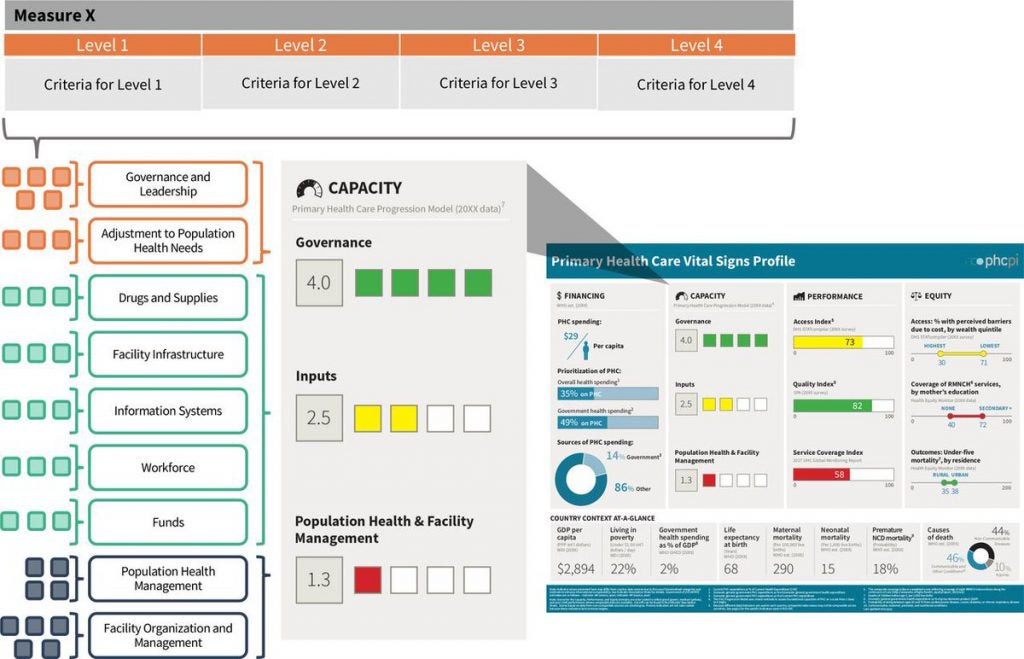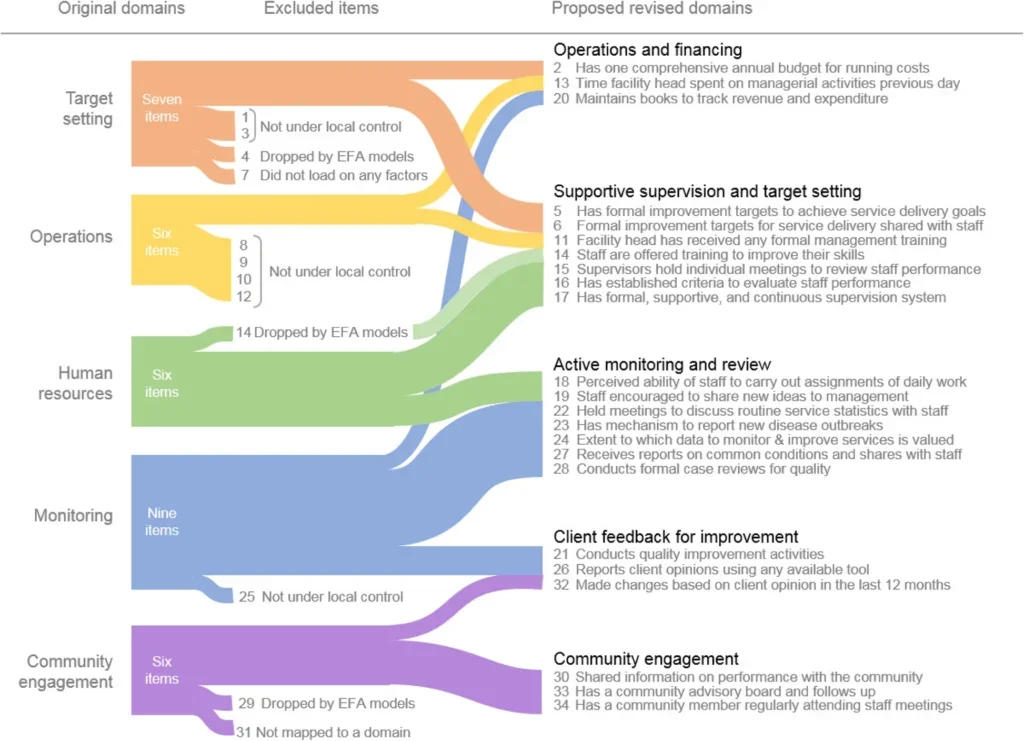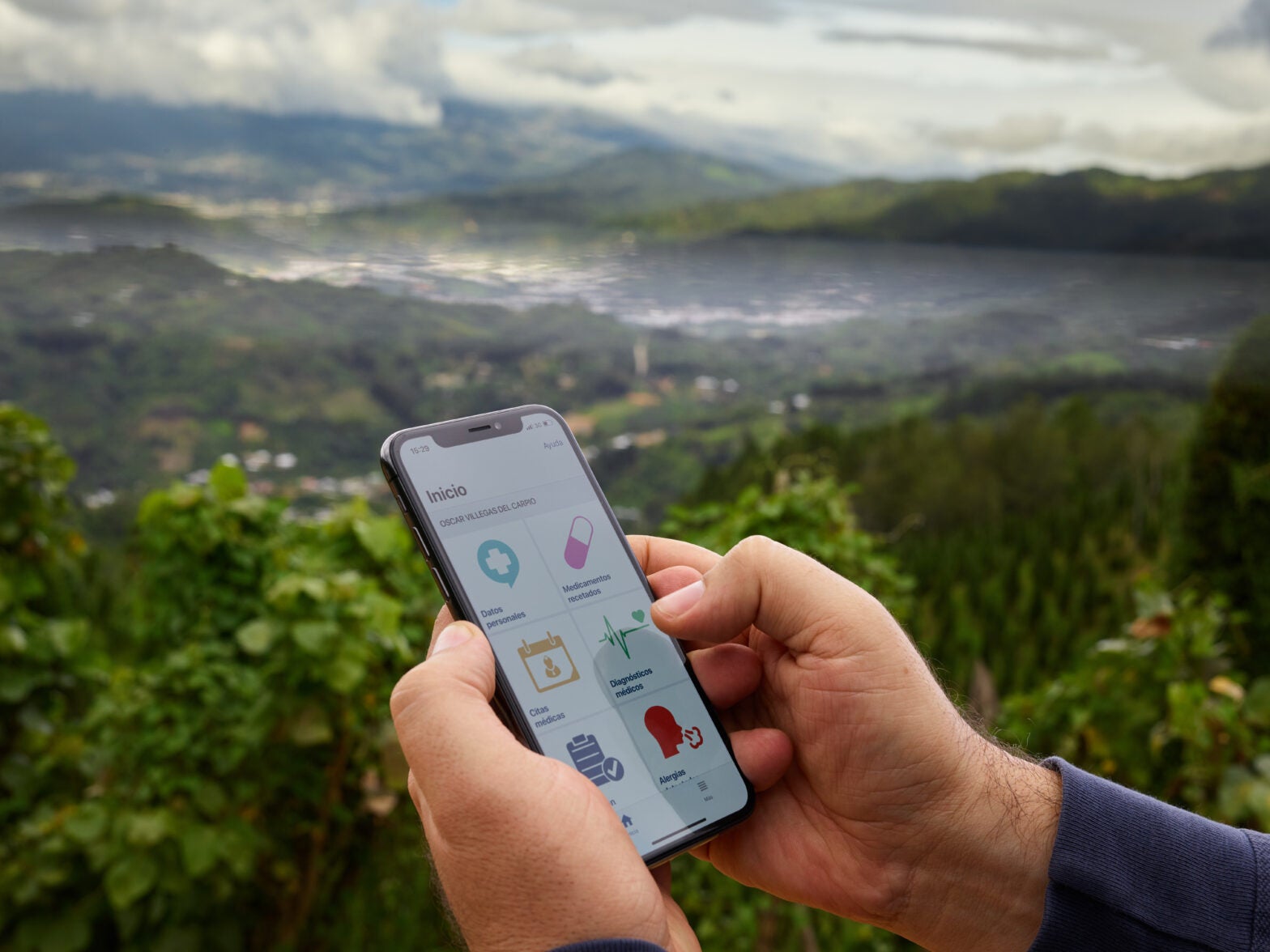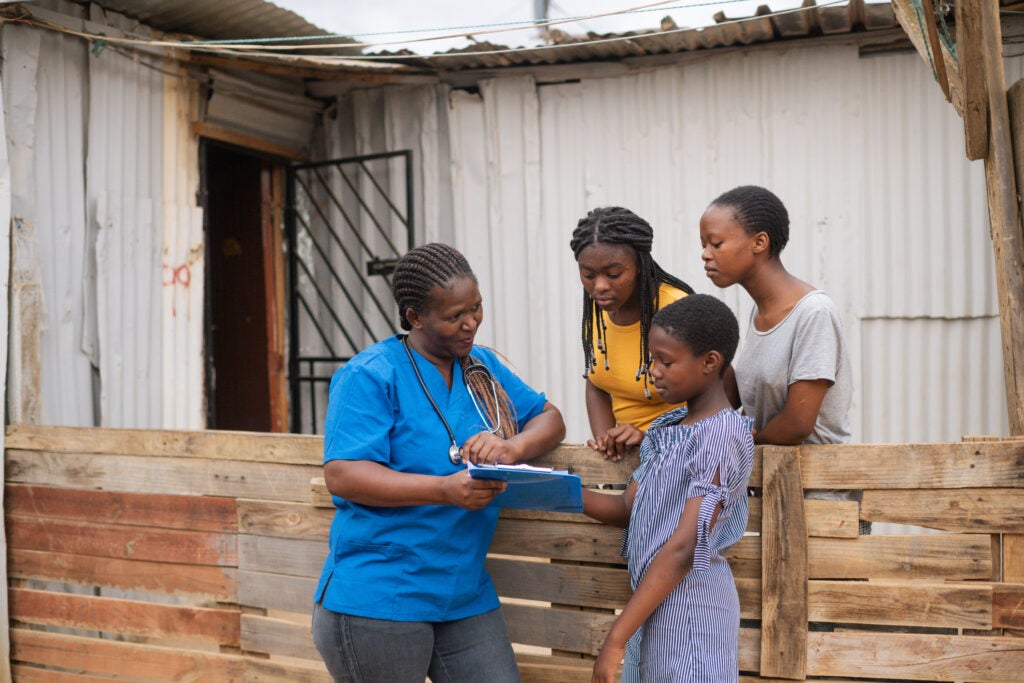The Ariadne Labs Primary Health Care Program develops and applies PHC measurement tools that equip leaders in the U.S. and around the world with the information they need to improve health care systems. Our tools offer insights into system capacity and performance and guide leaders on opportunities to improve. Our team also offers technical assistance to put those insights into action.
We strive to incorporate local nuances of care delivery to drive decision-making that aligns with the population’s needs. Our work has included providing country-level technical assistance to governments and other stakeholders to support the roll out of PHC measurement efforts across Sub-Saharan Africa, South and Southeast Asia.
We are also developing subnational data interpretation and use tools to:
- Enhance management capacity around PHC service delivery models at the community level;
- Pilot new maturity measurement approaches to establish performance scales for primary care networks;
- Study the connection between local PHC measurement systems and resilience.
PROJECTS
Primary Health Care Performance Initiative
The Primary Health Care Performance Initiative (PHCPI) (2015-2022) was a partnership between the Bill & Melinda Gates Foundation, World Health Organization, World Bank, UNICEF, Ariadne Labs, and Results for Development. PHCPI was dedicated to transforming the global state of primary health care through three interconnected areas of work: innovating and implementing more and better measurement; generating and disseminating evidence-informed improvement strategies; and fostering global, national, and local engagement on PHC strengthening.
Key outputs of the partnership include 30+ Vital Signs Profiles which provide a snapshot into the health of a country’s PHC system as well as 23 improvement strategies to aid policymakers in using data for actionable improvement.
The PHCPI PHC Digital Hub provides a centralized place to explore, understand, and take action on building blocks of strong primary health care, as adapted from the landmark 2022 WHO-UNICEF Primary health care measurement framework and indicators. PHCPI PHC Digital Hub allows users to dig into key concepts behind strong primary health care while leveraging the content and lessons from PHCPI’s tools and resources, such as the Vital Signs Profiles and Improvement Strategies.
MOMENTUM Knowledge Accelerator: Building a Framework for Actionable Change
Since 2022, Ariadne’s Primary Health Care Program has partnered with USAID Primary Impact through the MOMENTUM Knowledge Accelerator (MKA) to advance progress in health and survival globally through strengthened primary health care systems.
Building on global measurement work, the MKA team has supported the development of the Measurement for Action Framework (M4A) to prioritize actionable areas for change at the subnational levels of primary health care systems. The framework emphasizes opportunities to use measurements to improve service integration, quality, and equity.
Ariadne and the MKA team continue to support Primary Impact’s measurement strategy as the M4A framework is adapted and implemented in focus countries across Africa and Southeast Asia.
PROPEL Health: Strengthening local capacity in data use and decision-making
Ariadne Labs is a resource partner on PROPEL Health, a USAID-funded project that works with local implementers and health agencies to improve conditions for more equitable and sustainable health services, supplies, and delivery systems. Ariadne Labs contributes expertise in primary health care measurement and models of care. This includes developing tools to support facility and district-level leaders in interpreting and using data to drive PHC service planning and decision-making. These tools help bolster countries’ abilities to monitor and improve PHC performance and capacity within and across networks of care.
RESEARCH & DEVELOPMENT AREAS
Enhancing data interpretation and use
PHC Maturity Models
Maturity models describe how well national and subnational health systems perform in key capacity and service areas such as community engagement and partnership, integrated service delivery, resilience, responsiveness, and quality. Using this insight, stakeholders can develop a deeper understanding of their data, identify specific components of their PHC system that need attention, and effectively prioritize and plan improvement efforts.

PHC Scorecards
PHC scorecards highlight for providers, practitioners, policymakers, and funders what areas of a primary care system require investment. Under the Primary Health Care Performance Initiative (PHCPI) (2015-2022), Ariadne Labs supported the creation of Vital Signs Profiles, which provide a national snapshot of the performance of more than 30 low- and middle-income countries’ primary health care systems. These analyses shine a light on where systems are strong and where they have challenges. In 2023, Ariadne Labs collaborated with the Massachusetts Center for Health Information and Analysis (CHIA) and Massachusetts Health Quality Partners (MHQP) to develop and publish the Massachusetts Primary Care Dashboard, which monitors and creates awareness about the fragility of primary care in the Commonwealth, particularly following the devastation of the COVID-19 pandemic.
Measuring facility management and quality
Strong management of facilities is linked to better quality of care and service utilization. Our team’s previous work in Ghana demonstrated that facilities with higher management quality scores had better process outcomes and better experiential outcomes. Ariadne generates evidence and tools to continue to understand and strengthen this connection. Measuring management activities is a key step in identifying process gaps that hinder facilities’ ability to efficiently and effectively deliver comprehensive and patient-centered care to their communities.

Performance Monitoring for Action Survey
Ariadne Labs developed a new digital survey module for the Johns Hopkins University’s Performance Monitoring for Action survey. The module helps measure and assess how well PHC facilities are managed and the quality of the patient experience. The module was implemented in Uganda and Ghana, and results revealed the important role management of PHC facilities plays. Better management was associated with higher quality ratings, higher trust in providers, higher essential drug availability, and lower wait times.
The Odisha Survey
Ariadne Labs led development of a management survey module for the India Health System’s Reform Project, a research study at Harvard T.H. Chan School of Public Health that implemented a comprehensive facility survey across the state of Odisha, India. Results from the management module showed that targeted training initiatives may strengthen a primary care facility’s ability to retain staff and monitor performance.

The PRImary Care Facility Management Evaluation (PRIME) Tool
Many tools to measure management quality are costly to implement, often hospital-specific, and not designed for or deployed in low- and middle-income countries. The PRIME tool was created to fill this gap and help health officials and front-line managers measure PHC facility management in these settings.
The PRIME-Tool can be integrated into routine surveys. It focuses on five core management domains: active monitoring and review, supportive supervision and target setting, operations and financing, community engagement, and client feedback improvement.
Ariadne is applying implementation science to study how AI tools are being integrated into clinical service delivery.
Using Artificial Intelligence to improve quality of care
Leveraging Data Analytics
Artificial intelligence is rapidly evolving and shaping the health care landscape. For instance, Large language models (LLMs) which can summarize, generate, and predict content, are being developed and deployed as clinical decision support tools. These tools have the potential to make services more person-centered by improving access to and quality of patient-provider encounters.
Ariadne is applying implementation science to study how AI tools are being integrated into clinical service delivery. We are considering a framework and measures to understand and guide how and when AI can be used in primary health care to enhance clinical quality and access to care. We are assessing which health conditions and time points in the patient journey provide the best opportunities to leverage LLMs and other AI tools and how to monitor improvements in care quality and access.
We are looking for partners interested in collaborating to establish a set of implementation research measures for AI use in primary care to accelerate its use as a tool to drive meaningful change.







